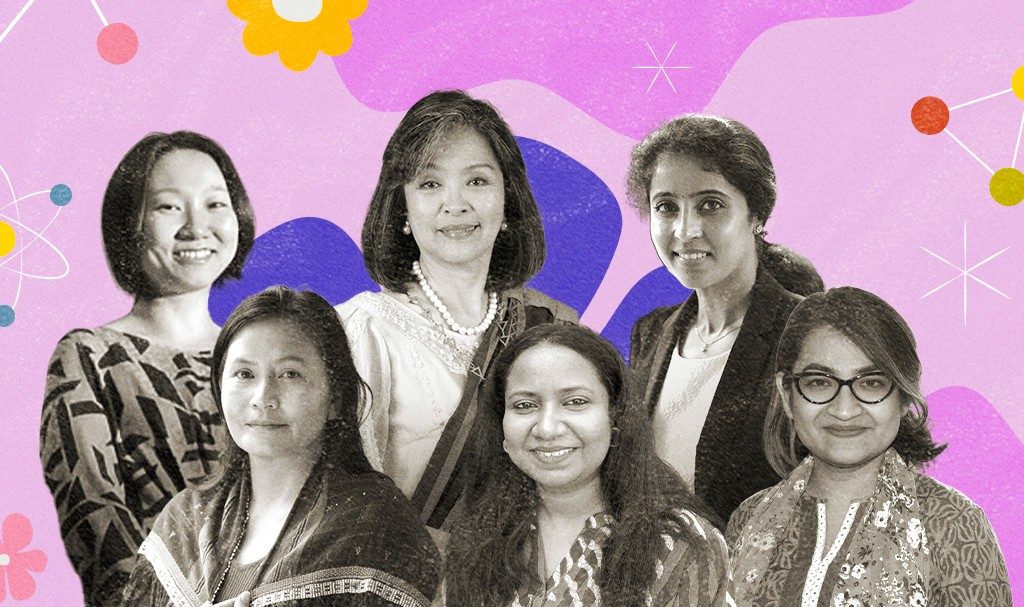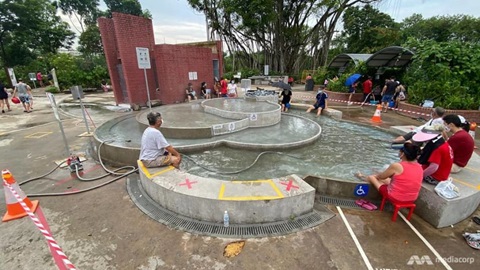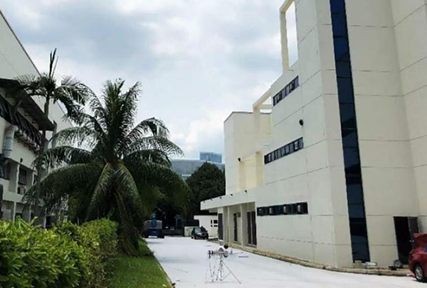Women Transforming Science
First published online at Asian Scientist
On this International Women’s Day, Asian Scientist Magazine speaks to six inspiring women in STEM who are leading their fields and have messages for younger women scientists in the region.

AsianScientist (March 8, 2024) – In celebration of International Women’s Day, Asian Scientist Magazine takes a look at the work of six incredible women scientists across Asia, who are reshaping their fields. Whether advocating for the preservation of Indigenous forests or exploring the impact of space weather on Earth, these women in STEM have not only catalyzed significant scientific breakthroughs and societal progress, but have also served as inspirations, empowering aspiring younger women scientists in the region.
Swati Nayak
Swati Nayak is a scientist at International Rice Research Institute (IRRI) who is known for her vital role in engaging smallholder farmers across Asia and Africa in rice seed systems. Farmers are involved from testing and deployment, ensuring equitable access and adoption of climate-resilient and nutritious rice varieties. Along with her role as the South Asia Lead for Seed Systems at IRRI, Nayak serves as the lead for cereal seed system group under the key initiative SeedEqual of CGIAR, a global research partnership dedicated to agricultural food systems.
Drawing from her grassroots experience, Nayak went on to head the first-ever dedicated Indian government initiative for women farmers. Her efforts have equipped farmers, both women and men, to optimize their yields, reduce their environmental footprint, and build economic resilience.
In 2023, she was awarded the Norman E. Borlaug Award for Field Research and Application. On this International Women’s Day, Nayak tells younger women scientists that their unique voice is worth celebrating.
“I always believe that our diversity is a power, a force—it is a catalyst for innovation,” Nayak said. “Trust in your abilities, your keen observations, and your work ethics, and let your scientific endeavours contribute in making a positive impact in this world.”
Alifa Bintha Haque
Alifa Bintha Haque, a National Geographic Explorer and Edge of Existence fellow, is a passionate marine biologist dedicated to conserving sharks and rays in the Bay of Bengal.
Haque is an assistant professor in the Department of Zoology at the University of Dhaka, Bangladesh. She believes in evidence-based marine conservation initiatives that are inclusive of fishers, who rely entirely on the ocean. By building allies within coastal communities, Haque educates and encourages fishers to release endangered species and collect time-series data on all landed sharks and rays.
Haque and her team have assembled the most extensive regional dataset on diversity, fisheries and trade, discovering globally-significant populations of highly threatened species. In 2023, she received the WINGS Women of Discovery Award for her incredible contributions to marine conservation in Bangladesh.
As a female Bangladeshi marine biologist, Haque is familiar of the gender-based challenges women face in STEM fields. Her advice to young women who feel a passion for science is to ‘keep at it’.
“Listen to your gut and find the power within you to make the most remarkable journey to be ‘YOU’,” she said. “I have not seen a single person in my little life who did the hard work honestly and did not achieve something beautiful.”
Delima Silalahi
Delima Silalahi’s environmental advocacy for Indigenous communities began as a volunteer for Kelompok Studi dan Pengembangan Prakarsa Masyarakat (KSPPM), an NGO committed to protecting traditional forests in North Sumatra, where many districts face deforestation for industrial plantations.
Today, she is the executive director of KSPPM and her team’s activism has secured legal stewardship of 17,824 acres of tropical forest land for six Indigenous communities. This land was reclaimed from a pulp and paper company—the most powerful industry in the region. The Indigenous communities have started the process of restoring the forests, generating crucial carbon sinks of biodiverse Indonesian tropical forest.
In 2023, Silalahi was honoured with the Goldman Environmental Prize, also dubbed as the “Green Nobel”. She hopes that progress in science and technology can work on reconciling our relationship with nature.
“Be a young woman scientist who supports the sustainability of planet earth, actively participates in ensuring climate justice, and pursue research development—especially knowledge which preserves the reconnection of spirituality between human and nature,” she urged.
Carmencita M. David-Padilla
Carmencita M. David-Padilla is renowned for founding the country’s first Medical Genetics Unit at the University of the Philippines Manila’s College of Medicine. The unit later evolved into the Institute of Human Genetics, becoming an essential entity within the National Institutes of Health—UP Manila.
Padilla’s dedication to health and research inspired her to craft and lobby for the Rare Disease Act and the Newborn Screening Act, implementing a comprehensive newborn screening program in the Philippines.
She has been the Chancellor of the UP Manila since 2014 and a Professor at the Department of Pediatrics at UP Manila College of Medicine. For her significant contributions in the field of medicine, Padilla was conferred the Order of National Scientists by the President Bongbong Marcos.
“Around 60% of the world’s population is here in Asia, where age-old and emerging problems beset all levels of our societies,” Padilla said. “Therefore, I urge you, our young Asian women scientists, to sharpen your skills and apply your hearts toward uplifting the lives of our people!”
Madhavi Srinivasan
As an advocate for a zero-waste circular economy which maximizes the use of resources, Madhavi Srinivasan directs her expertise toward sustainable recycling of electronic waste and advanced energy storage solutions.
Srinivasan is currently a professor at Nanyang Technological University (NTU), Singapore and Executive Director of NTU Sustainability Office and Energy Research Institute at NTU. Her pioneering “waste-for-waste” approach involves using orange peel waste to recover precious metals from lithium-ion battery waste, enabling the production of functional batteries once again.
Among her numerous prestigious awards, Srinivasan received the 2023 honorable mention of the Underwriters Laboratories-ASEAN-U.S. Science Prize for Women for her work on improving battery performance in electric vehicles, utilizing energy-efficient design principles. Srinivasan encourages aspiring women scientists to keep moving forward, even in the face of obstacles.
“Believe in yourself, your path, your vision and don’t give up. Keep giving your best every day in everything and develop resilience to turn setbacks into stepping stones,” she said.
Hiroko Miyahara
Hiroko Miyahara, a professor at Musashino Art University in Japan, explores changes in the space environment by putting on her hiking boots and heading off to the woods. As nature’s climate diaries, tree rings carry records of the environmental conditions they have weathered each year.
By analyzing individual rings from old Japanese cedar tree stumps, Miyahara and her colleagues were able to discern long-term fluctuations in cosmic radiation and solar activity by correlating it to the amount of carbon-14 found within. The tree rings also revealed the temperatures at the time of their growth.
The data she collected has the potential to reconstruct the 11-year solar cycles with nearly identical precision to conducting direct observations of the solar surface. Miyahara’s research also tries to understand how solar activity influences the Earth’s climate. In 2023, Miyahara was awarded the 43rd Saruhashi Prize for her work.
—
Copyright: Asian Scientist Magazine; Cover image: Yipei Lieu/ Asian Scientist Magazine
Disclaimer: This article does not necessarily reflect the views of AsianScientist or its staff.














/enri-thumbnails/careeropportunities1f0caf1c-a12d-479c-be7c-3c04e085c617.tmb-mega-menu.jpg?Culture=en&sfvrsn=d7261e3b_1)

/cradle-thumbnails/research-capabilities1516d0ba63aa44f0b4ee77a8c05263b2.tmb-mega-menu.jpg?Culture=en&sfvrsn=1bc94f8_1)

7e6fdc03-9018-4d08-9a98-8a21acbc37ba.tmb-mega-menu.jpg?Culture=en&sfvrsn=7deaf618_1)






